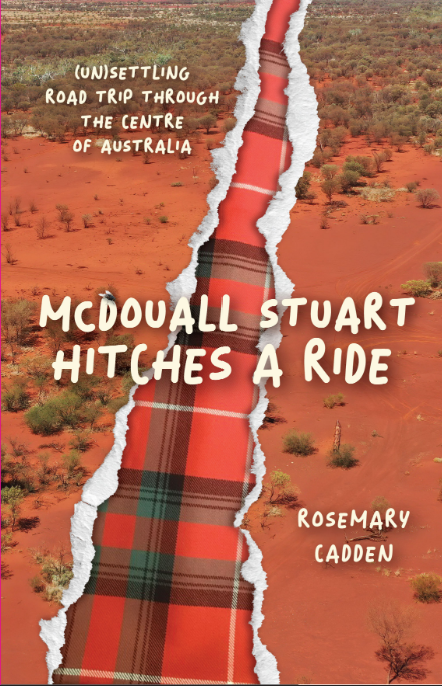This site may not work properly using older versions of Edge and Internet Explorer. You should upgrade your browser to the latest Chrome, Firefox, Edge, Safari, or any other modern browser of your choice. Click here for more information.
Your Stories
This is where we tell your stories, cover topical issues and promote meaningful initiatives.
Regular CRANAplus Magazine writer reflects on the 2015 conference in new book
In the 2010s, Journalist Rosemary Cadden travelled from Adelaide to the Top End in the footsteps of explorer and fellow Scot, John McDouall Stuart. On the way, she attended the 2015 CRANAplus Conference in Alice Springs, an experience she discusses in her new book, McDouall Stuart Hitches a Ride. Here's what she had to say.
I thought of another connection with McDouall Stuart. He still had to do surveying work for Chambers and Finke on his early expeditions. I’m the same. I’m funding this trip with a writing gig in Alice Springs at a remote nurses conference. That means I’m travelling through the centre a bit later than I’d like. McDouall Stuart, too, didn’t have a choice on the timing of his trips.
I go straight to one of the caravan parks and pitch my tent which looks small and lost among the motor homes and trailers. I head for a café along the road to check my notes about bush tucker and bush medicine and hopefully get a decent coffee. Despite the noonday heat, I’ve chosen an outside table in the garden. I’m not quite ready for walls. Am I turning into McDouall Stuart? Heaven forbid.
I’m loving this reintroduction to refined living; internet access, a comfy chair and a decent coffee, a fan wafting the air and an awning shielding the laptop screen from the sun’s reflection. Sheer luxury. At this very moment, a room is being prepared for me at a posh hotel not far from here, where I’ve got three days’ work at a remote health workers’ conference. Fluffy pillows and a mattress off the ground. Will I want to return to basic camping after that?
One of my aims on this trip is to explore how much better McDouall Stuart might have fared if he’d been able to chat with the locals for tips on which plants to eat…
‘Stick to bush tucker,’ one of the teachers says [en route to the conferece]. ‘Stay away from Aboriginal issues. You’ll be deliberately misunderstood by one side or the other, and probably both.’ I’ve no intention of staying away from Aboriginal issues. Remote and rural health workers from all over Australia are attending the conference where I’ll be writing stories about the proceedings. That gathering won’t flinch from talking about inequalities in Aboriginal communities. The presenters know their stuff about health conditions that persist in remote areas of Australia, diseases that shouldn’t be tolerated in a first-world country but are. I’ll ask about scurvy.
‘Ah. The Aboriginal problem.’ ‘What’s to be done.’ ‘No one has the answer.’ Now we’re onto responses that usually stop any further debate, followed by a communal helpless shaking of the head. I point out that the participants in the conference will be proposing all manner of solutions, from pathways for Aboriginal people who aspire to study health at university to programmes within communities, such as caring for country, all of which could have positive effects on health outcomes. But I’ve lost their attention. The teachers are more interested in my hotel room. ‘We’ll take it off your hands,’ says Jean, lusting after the mattress off the ground. ‘Plump, fluffy pillows,’ sighs Sue.
I listen to a presentation written by Pat Anderson, Alyawarre woman, founding chair of the Lowitja Institute. First Nations people find they are not spoken to, rather they are spoken about, she pointed out.
‘It’s a tragedy that racism still exists in Australia,’ is the message in the address from CRANAplus CEO at the time, Chris Cliffe. ‘The evidence is clear: racism has a direct and profound impact on not only the emotional but also the physical health of victims.’
‘Our nation is a wealthy, well-connected, peaceful, developed country,’ he said. ‘But still, the further away people live from a capital city, the worse their health becomes.’ This is because of the inequity of services in remote areas compared to the cities.
And a call to action comes from Professor Roianne West, born and raised Kalkadoon on her grandmother’s ancestral lands in North West Queensland, who outlines her vision.
‘I want to see my people socially and economically included in the nation. I want to see our kids educated, healthy and with the opportunity to grow up and get jobs and to be engaged in meaningful activity. I want to see our people living in good housing. I want our children to have good food to eat, fresh air to breathe and clean water to drink.
‘Not too much to ask.’
Book blurb. Journalist and adventurer Rosemary Cadden gets more than she bargained for when explorer and fellow Scot, John McDouall Stuart, joins her on a road trip to retrace his tracks from Adelaide to the Top End of Australia. They are a tetchy couple but rub along as they drive around mountain ranges, through sandy deserts and into the lush tropics in Bad-Ass Betsy, the ever-reliable Toyota, dealing with flies, leeches and howling dingoes. In a time when many of us want to better understand our history, the explorer’s constant presence on the trip and the people she meets along the way force Rosemary to question what she knows and how much she still has to learn about this country she now calls home.
